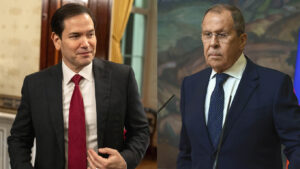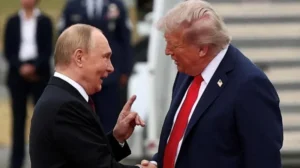AViewBC says
Justice Amy Coney Barrett read aloud from special counsel Smith’s brief, in which he made the case that even if the Supreme Court were to decide there was some immunity from official acts, there were sufficient private acts in the indictment for the trial to proceed immediately.
Maureen Groppe
Jackson pushes for quick, narrow decision
Justice Ketanji Brown Jackson appeared to be trying to convince her colleagues to decide the case quickly and narrowly.
If the court wanted to use the case to decide all the possible times when a president does or doesn’t have immunity, she asked the Justice Department, “is this the right vehicle to hammer out that test?”
“I want to know if you agree or disagree about the characterization of these acts as private,” she said.
“You concede that private acts don’t get immunity,” she told John Sauer, Trump’s lawyer, who said, “We do.”
He went on to say that some purported actions in the indictment were indeed “private” — including Smith’s allegation that Trump turned to a private attorney who knowingly spread false claims of election fraud to spearhead his challenges to 2020 election results and that he conspired with others to implement a plan to obstruct the certification of President Joe Biden’s win.
“So those acts you would not dispute,” Barrett said. “Those were private and you would not raise a claim that they were official?”
Sauer agreed.
Other justices returned to that line of questioning while pressing Sauer over the rest of his questioning.
BBC reports, Trump’s lawyer is pushed by several justices on the limits of immunity, and asked if a hypothetical coup or bribe would count as an official act
Justices also grill the prosecution lawyer, asking if failing to grant some form of immunity might open presidents up to bad faith prosecutions
Trump’s trial on charges he tried to overturn the 2020 election is on hold while the Supreme Court considers his immunity claim The Supreme Court is hearing arguments on former President Donald Trump’s claim of presidential immunity from prosecution in special counsel Jack Smith’s election interference case against him.
Arguments began at 10 a.m. ET.
Trump’s lawyers argue that his efforts to overturn the 2020 election were “official acts” taken in office. His attorney D. John Sauer will make Trump’s case before the court, while Michael Dreeben will argue for the U.S.
The court, which has a 6-3 conservative majority, including three justices appointed by Trump, has come under criticism for the delay in considering the former president’s appeal as the November presidential election approaches.
recap
Before Dreeben started speaking, Justice Ketanji Brown Jackson said the Oval Office risked becoming a “seat of criminal activity” which allows the president to commit “crime with abandon”.
She raised concern about a president having those kinds of powers, “the most powerful person in the world with the greatest amount of authority”, going into office knowing that there would be no potential penalty for committing crimes.
“I’m trying to understand what the disincentive is from turning the Oval Office into the seat of criminal activity in this country,” she said.
Trump’s lawyer, Sauer, responded that he doesn’t think there’s any allegation of that in Trump’s case.
She then asked: if the potential of criminal liability is taken off table, wouldn’t there would be a significant risk that future presidents would be emboldened to commit crimes with abandon while they’re in office?
Article share tools
View more share options
Share this post
Copy this link
https://www.bbc.com/news/live/world-us-canada-68892030?ns_mchannel=social&ns_source=twitter&ns_campaign=bbc_live&ns_linkname=662a714a683d9934d25c760f%26Oval%20Office%20could%20become%20a%20%27seat%20of%20criminal%20activity%27%262024-04-25T15%3A07%3A55.604Z&ns_fee=0&pinned_post_locator=urn:asset:c8c29538-a65f-4819-aa8c-acada3e8c79d&pinned_post_asset_id=662a714a683d9934d25c760f&pinned_post_type=share
Read more about these links.




